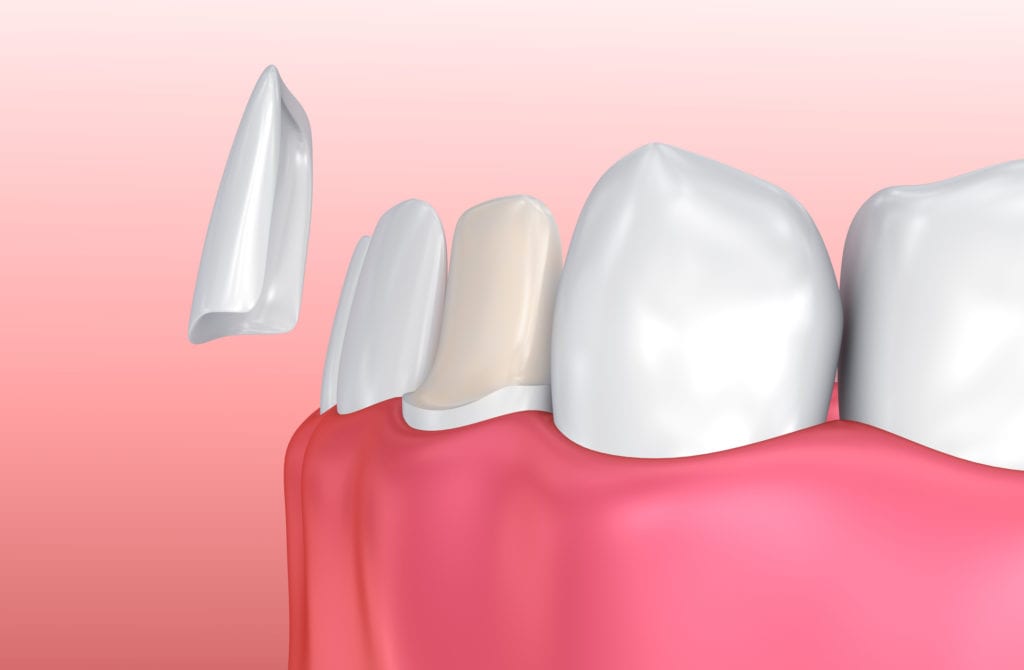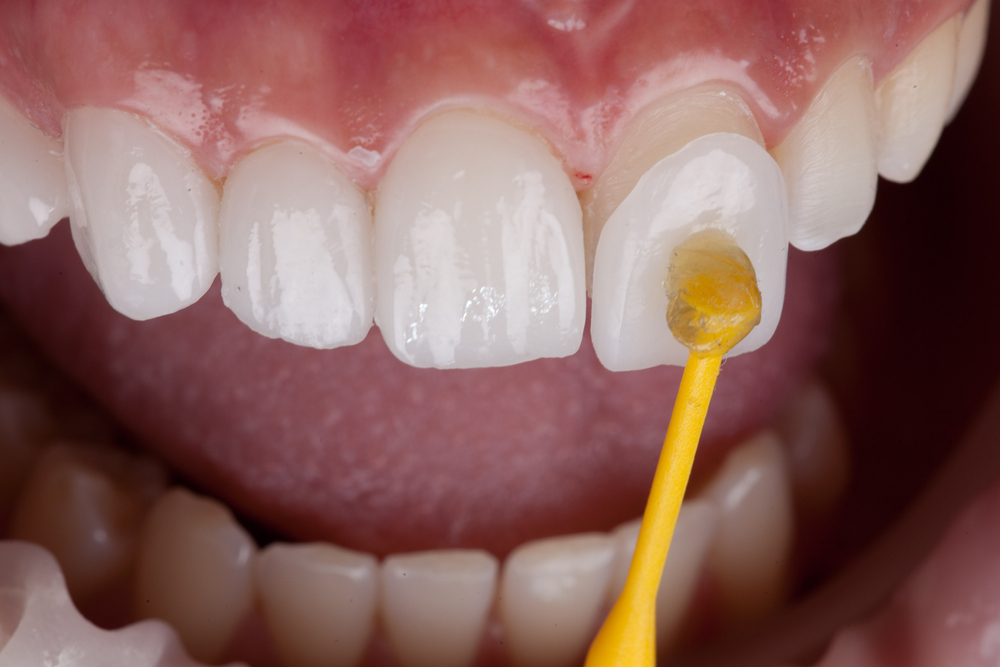How What Are Veneers Compare to Other Cosmetic Dental Options
The Complete Overview of Veneers: Kinds, Makes use of, and Their Impact on Your Smile
Veneers work as a preferred solution for people looking for to enhance their dental appearances. These custom-crafted shells can efficiently mask imperfections such as discoloration and voids. With 2 main types offered, porcelain and composite resin, each offers unique benefits and restrictions. The influence of veneers extends beyond plain look, affecting self-esteem and social communications. Understanding their kinds and advantages is important. What might this imply for one's overall high quality of life?
Understanding Veneers: What They Are and Just how They Work
Veneers are thin coverings, typically made from porcelain or composite material, that are custom-crafted to fit over the front surface of teeth. They serve both functional and visual purposes, supplying a solution for numerous oral imperfections such as discoloration, spaces, and small imbalances. By adhering to the tooth enamel, veneers produce a natural appearance while enhancing the shape and shade of the teeth.
The process typically includes an initial appointment, where a dentist assesses the patient's needs and goes over preferred results - Veneers Teeth. Following this, a very little amount of enamel might be eliminated to accommodate the veneer. Impressions of the teeth are after that required to assure a precise fit. As soon as produced, the veneers are bound securely to the teeth utilizing a special oral adhesive. This procedure not only enhances the smile's appearance yet also assists safeguard the underlying teeth from more damage, making veneers a prominent option for lots of looking for a smile transformation
Types of Veneers: Porcelain vs. Composite Material
The distinction between porcelain and composite material veneers depends on their material composition and attributes. Each kind supplies varying degrees of expense, longevity, and resilience, influencing individuals' selections based on their specific requirements. Comprehending these distinctions is necessary for making a notified decision regarding dental improvements.
Material Differences Clarified
While both porcelain and composite material veneers offer the exact same cosmetic purpose, they differ significantly in material residential properties, longevity, and visual outcomes. Porcelain veneers are crafted from a ceramic material that imitates the natural transparency of teeth, providing a lifelike appearance. Their smooth surface is resistant to discoloration, making them an enticing choice for those looking for a resilient visual. On the other hand, composite resin veneers are made from a tooth-colored plastic material, providing convenience and simplicity of application. They may not attain the exact same level of brightness or translucency as porcelain. Additionally, composite veneers can be extra quickly shaped and fixed, making them an extra versatile alternative in specific oral situations. Each kind provides one-of-a-kind advantages customized to individual preferences.
Longevity and Longevity
When comparing porcelain and composite resin veneers, durability and toughness are significant elements. Porcelain veneers are known for their strength, commonly long lasting 10 to 15 years with proper care. Their durability against cracking and discoloring makes them a preferred option for people looking for lasting results. On the other hand, composite material veneers usually have a much shorter life expectancy, averaging 5 to 7 years. While they can be fixed much more conveniently if harmed, they are much more prone to wear and staining gradually. The choice in between these products usually depends upon the person's way of life, visual objectives, and upkeep preferences. Inevitably, understanding the differences in longevity and resilience can direct people in choosing the veneer type that finest matches their needs.
Cost Comparison Insights
Cost is a vital consideration when choosing in between porcelain and composite resin veneers. Porcelain veneers commonly vary from $800 to $2,500 per tooth, showing their toughness, aesthetic appeal, and resistance to staining. These veneers call for a more substantial treatment and specialized laboratory job, adding to their higher rate tag. In comparison, composite resin veneers are usually much more budget friendly, costing in between $250 and $1,500 per tooth. They can be used in a solitary go to, which decreases labor expenses. Nevertheless, composite veneers may require more constant substitutes, possibly boosting lasting expenses. Inevitably, the option in between porcelain and composite material veneers relies on private budget plans and wanted outcomes, stabilizing preliminary expenses against durability and aesthetic results.
The Benefits of Deciding On Veneers for Your Smile
Selecting veneers offers substantial benefits for those looking for a boosted smile. Their enhanced aesthetic charm can transform the appearance of teeth, while their stain-resistant buildings ensure a long-term brightness - Dental Veneers. This combination makes veneers a prominent alternative for individuals aiming to accomplish a remarkable smile
Enhanced Visual Allure
When people seek to enhance their smiles, veneers usually become a favored solution because of their transformative aesthetic benefits. These slim shells, normally constructed from porcelain or composite material, can successfully hide blemishes such as chips, spaces, and misalignment. By mimicking the all-natural look of teeth, veneers give a smooth, radiant smile. Their customizable nature permits a customized strategy, making it possible for people to choose shades and shapes that finest fit their face attributes. Furthermore, veneers can develop an uniform look, enhancing overall facial balance. This visual improvement not only enhances confidence yet can also favorably influence social communications and personal relationships, making veneers a popular option for those wanting to attain a brighter, much more attractive smile.
Tarnish Resistance Benefits
Veneers not just boost visual charm however also provide significant tarnish resistance, making them an appealing alternative for individuals concerned regarding preserving a bright smile. Composed of sturdy products such as porcelain or composite material, veneers are less permeable than all-natural teeth, which helps prevent the absorption of discolorations from common wrongdoers like coffee, tea, and merlot. This integral stain resistance enables individuals to enjoy their favored drinks without stressing regarding discoloration. Dental Veneers. Additionally, the smooth surface area of veneers makes them less complicated to clean, further enhancing their durability and maintaining their immaculate appearance. Therefore, veneers give a useful remedy for those seeking both charm and functionality in their oral care
The Process of Getting Veneers: What to Expect

The process of obtaining veneers might appear challenging, understanding the steps included can minimize concerns. An examination with a dental professional is required to identify if veneers are the appropriate remedy for Check Out Your URL the individual's oral problems. Throughout this appointment, the dental expert will certainly discuss preferred results and take perceptions of the teeth.
Next, a 2nd appointment is scheduled for tooth preparation, where a tiny amount of enamel is typically removed to suit the veneers. Short-lived veneers might be positioned while the custom-made ones are crafted in a dental laboratory, which generally takes a number of weeks.
Once all set, the dental expert will certainly position the veneers, ensuring proper fit and color before bonding them to the teeth making use of a special adhesive. After last modifications, the dental expert will certainly give guidance on care. Comprehending these steps can aid patients really feel much more comfortable and informed throughout the veneer process.
Upkeep and Treatment for Your Veneers
Preserving veneers requires consistent like assure their longevity and appearance. Proper oral hygiene is important; cleaning two times daily with a non-abrasive tooth paste and flossing regularly assist protect against plaque build-up around the veneers. Furthermore, regular dental check-ups are essential for keeping track of the problem of the veneers and attending to any type of prospective issues early.
Clients must stay clear of hard foods and too much pressure when biting to prevent damage. It's likewise suggested to limit usage of staining materials, such as coffee, tea, and merlot, as these can influence the veneers' color over time.

Changing Your Smile: Real-Life Impact of Veneers
A glowing smile can considerably boost one's confidence and general appearance. For numerous people, veneers act as a transformative solution, successfully attending to numerous oral issues such as staining, gaps, and misalignment. These thin shells, personalized to fit over the front of the teeth, can develop an unified and aesthetically pleasing smile.
Real-life instances highlight the extensive influence veneers can have. Individuals usually report a prompt boost in self-confidence and social interactions following their treatment. The newly found self-confidence can bring about more opportunities in specialist and individual life, as people really feel even more inclined to involve and share themselves.
In addition, the psychological advantages extend past simple appearance; numerous experience boosted psychological well-being as they welcome their smiles. As a result, veneers not just improve physical characteristics however additionally add considerably to overall lifestyle, emphasizing their value in cosmetic dental care.
Regularly Asked Inquiries
For How Long Do Veneers Typically Last Prior To Needing Substitute?
Veneers usually last in between 10 to 15 years prior to needing replacement. Elements such you can try this out as oral health, oral behaviors, and the kind of product made use of can affect their durability and overall sturdiness. Normal oral examinations are a good idea.
Can Veneers Be Eliminated, and if So, Just how?
Yes, veneers can be eliminated. A dental expert normally makes use of customized devices click to read more to meticulously remove them from the teeth, guaranteeing very little damage to the underlying enamel, frequently complied with by needed adjustments or repairs for suitable visual appeals.
Are Veneers Suitable for Every person's Dental Problem?

Will Getting Veneers Pain or Require Anesthetic?
Getting veneers generally includes very little discomfort, and many individuals get regional anesthesia to guarantee a pain-free experience. Sensitivity may happen briefly afterward, however a lot of find the process tolerable and are satisfied with the outcomes.
Exactly How Do Veneers Affect Tooth Level Of Sensitivity After Positioning?
Veneers can momentarily increase tooth level of sensitivity because of the elimination of enamel and the bonding procedure. Most individuals experience a decline in sensitivity over time as the teeth get used to the new veneers.
Veneers are thin coverings, generally made from porcelain or composite material, that are custom-crafted to fit over the front surface area of teeth. Porcelain veneers are crafted from a ceramic product that imitates the all-natural translucence of teeth, offering a natural appearance. Porcelain veneers normally vary from $800 to $2,500 per tooth, showing their durability, aesthetic allure, and resistance to discoloration. In contrast, composite material veneers are usually a lot more affordable, setting you back in between $250 and $1,500 per tooth. Made up of resilient products such as porcelain or composite material, veneers are less porous than all-natural teeth, which aids prevent the absorption of discolorations from usual perpetrators like coffee, tea, and red wine.